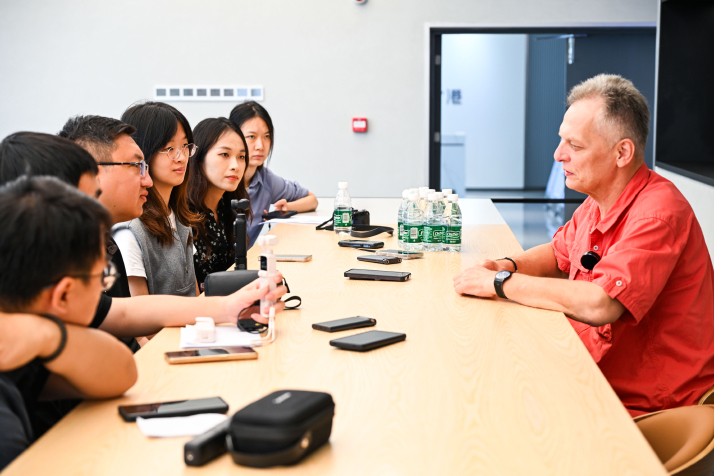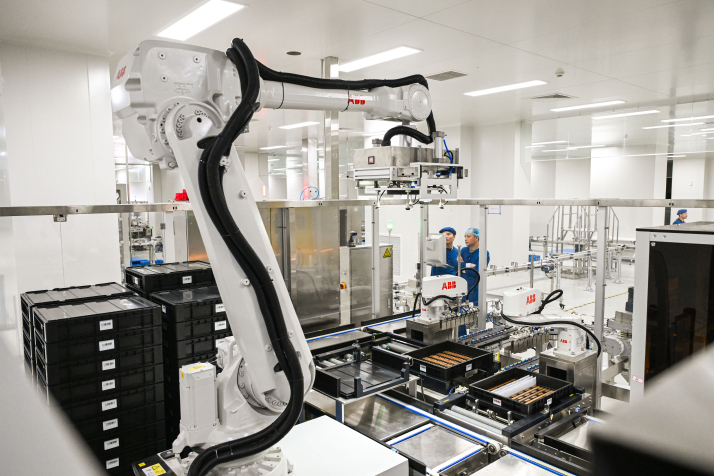| China |
| Suzhou Welcomes the World | |
|
|
 German engineer Andreas Guenter Hester meets journalists at Ivy International Talent Port in Changshu, Suzhou, Jiangsu Province, on August 26 (WEI YAO)
Once renowned for silk and classical Chinese gardens, Suzhou, an eastern city in Jiangsu Province, only about 80 km west of Shanghai, has transformed into a global workplace layered atop 2,500 years of history. Throughout the city, badge readers blink, espresso machines hiss, and meetings shift back and forth between Chinese and English. Many engineers, scientists and entrepreneurs from around the world now describe the city with the same phrase: their "home away from home." These individuals are part of a wider transformation. In Suzhou, foreign talent is driving progress across fields ranging from AI and biomedicine to precision machinery and cultural entrepreneurship, shaping not only laboratories and startups, but also factory floors and classrooms. A talent-friendly city Suzhou's ascent as a magnet for foreign professionals is rooted in deliberate policy design. In recent years, the city has crafted a comprehensive "1+8" framework of talent-friendly measures. These range from fast-track services for visa and residence permit issuance to housing subsidies and research funding, all designed to provide a seamless transition from living abroad to living in Suzhou. Top-notch recruits benefit from generous support: project grants up to 100 million yuan ($14 million), housing subsidies of up to 10 million yuan and streamlined access to research infrastructure. Middle-tier professionals and young graduates are also encouraged through living allowances, rent subsidies and startup financing. For foreign scientists, a one-stop service center integrates application for work and residence permits and social security services into a single process. German engineer Andreas Guenter Hester is the research and development (R&D) director at SIGAS Measurement Engineering Corp., a maker of gas analysis and monitoring systems based in Changshu, a county-level city in Suzhou. He arrived in 2010 under Suzhou's Seagull global talent recruitment scheme, which streamlines the introduction of foreign personnel. Together with two Chinese partners, he built SIGAS, which has grown into an industry benchmark with 127 employees. "I've worked in nearly 30 countries, and there are many places where I'd never consider starting a company. I didn't know how it works, how to do it. But here in China, for sure, we find a way," Hester said in a group interview on August 26. In April 2021, Hester received China's Foreign Permanent Resident ID Card. Beyond the occasional trip to Suzhou or Shanghai with friends, he said he prefers exploring everyday life, local food and local culture, a habit he credits to his Chinese colleagues. "What's better in China is that people aren't afraid of trying something new," he said. Stories like Hester's are not uncommon. Suzhou has built an ecosystem to welcome and retain talent, and the annual International Elite Entrepreneurship Week shows how policy works. Over the past 17 years, it has drawn more than 40,000 overseas professionals and connected 35,000 projects, some now global players. Locals sum up the city's ambition as "Suzhou gathers global talent" and "those who come to Suzhou will make a difference."  A robotic arm operates on the production line at OcuMension, an ophthalmic drug manufacturer, in Suzhou, Jiangsu Province, on August 29 (WEI YAO)
Foreign experts in action The impact of foreign professionals becomes visible in the laboratories, factories and offices scattered across Suzhou's industrial parks. Seven years after moving to Zhangjiagang, another county-level city under Suzhou's administration, Yun Chong Man from the Republic of Korea speaks highly of the city's sound living and business environment. He has fully settled in and hopes to stay for the long term. His company, iAsemi, is carving out a lead in high–value-added power semiconductors, built on proprietary design and processing technologies. For Greek educator Babis Georgakainas, now Center Principal of Zhangjiagang Ivy Experimental High School, the draw is as much about peace of mind as it is about opportunity. "I've been to 45 countries, China is the safest," he told Beijing Review. "It's the work environment and policies that support foreign professionals. Our contracts are clear, so all we need to do is our job." Georgakainas believes cultural exchange is part of learning. In January, he helped send a group of students from his school to Greece for a study tour, where the Second High School of Paleo Faliro welcomed them into language, culture and hands-on classes. Chinese and Greek students learned side by side, and the Chinese students immersed themselves in local life. In April, Greek teachers and students came to China for the return leg, an exchange that forged a bridge of communication and friendship between the two schools. Germany's presence in Suzhou is especially visible in Taicang, a long-standing hub for German companies and investment. From the first arrival in 1993, more than 550 German firms have clustered there, forming specialized industrial ecosystems in automotive parts, aerospace and industrial machinery. Currently, about 30 percent of foreign professionals in Taicang come from Germany. Biotech is another area in which foreign expertise shapes outcomes in Suzhou. At OcuMension, CEO Liu Ye leads a team that has built an end-to-end platform spanning ophthalmic drug R&D, manufacturing and commercialization. Asked why he returned from the U.S. to launch a company in Suzhou, Liu pointed to the ecosystem, more than subsidies. "It's about talent and the full suite of equipment and research infrastructure," he said. "Among the places in China I've seen, Suzhou has the most complete biopharma value chain and the strongest supporting facilities." Life beyond the lab Attracting foreign professionals is challenging; retaining them requires more efforts. Here Suzhou makes full use of its cultural heritage and modern amenities. International schools provide multi-language curricula for expatriate families, while hospitals provide international medical services. Su-Pay, a mobile solution that integrates international cards with China's ubiquitous QR-code payment services, has also been launched to facilitate the use of mobile payment for short-term foreign visitors. Additionally, residential clusters in the Suzhou Industrial Park, where more than 12,000 foreign nationals from 130 countries reside, feature cross-cultural events and legal workshops tailored for newcomers. Integration takes personal forms, too. American educator Simon Head, Principal of UWC Changshu China, founded in 2015 as the first United World College on the Chinese mainland, finds community on two wheels and on foot. "I cycle and run because it connects me with people across Suzhou," he said. "We have mountains, green spaces, and very friendly people. It doesn't feel crowded to me, there's personal space and a lot of opportunities for growth." He said in an interview on August 26. Suzhou's experience illustrates a broader trend: second-tier Chinese cities, mostly the capitals of and coastal cities in developed provinces, emerging as global talent magnets, complementing the country's four first-tier megacities of Beijing, Shanghai, Shenzhen and Guangzhou. Suzhou's trajectory points toward deeper integration of global talent in national development. The launch of major platforms, including the National Biopharmaceutical Technology Innovation Center, the Third-Generation Semiconductor Innovation Center and the Suzhou Laboratory, boosts demand for specialized international expertise. City planners talk of cultivating an international talent ecology: policies that attract, services that retain, and culture that integrates. The vision is clear, by making foreign professionals feel both appreciated and at home, Suzhou accelerates its transformation into a global innovation hub. For a city with 2,500 years of history, Suzhou's latest chapter may well be defined by how it opens its ancient gates to the world's innovators. BR (Reporting from Suzhou, Jiangsu Province) Copyedited by G.P. Wilson Comments to zhaowei@cicgamericas.com |
|
||||||||||||||||||||||||||||
|